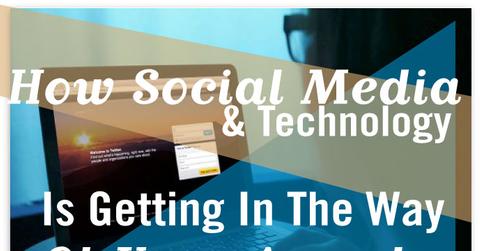How Social Media & Technology Is Getting In The Way Of Your Agenda

As young adults in the digital age, social media and technology have become major parts of everyday life but how exactly could social media and technology be negatively impacting us today? We pulled some research and spoke with some experts who provide insight and offer ways to ease up on your go-to digital outlets.
How Does It All Start?
It all starts with the Nucleus Accumbens, also known as the brain’s “pleasure system.” Whenever you do an activity that the brain likes, it will reward you with a good feeling, causing you to want to repeat the activity.
For all of you social media and game lovers out there, you know what I’m talking about- it’s easy to get hooked. I’m not proud it, but I am truly addicted to the game, Sims FreePlay. When I first started, it wasn’t very addictive, because I didn’t know how to play. But as time went by, and I mastered the basics, I became obsessed with it. It’s one of the first things I do in the morning and last things I do at night. Pathetic, right?
But wait, there’s more. Psychologist, Dr. Archibald D. Hart explains the scientific reasoning to why this happens. He writes, “If the pleasure system is overused, the experience of the pleasure is diminished. You are then driven to seek a higher level of stimulation.”
Basically, your technology tendencies are putting your pleasure system on overload, and your brain is trying to keep up with your thirst to satisfy it. Does this pattern sound familiar? It is called the “addictive process,” and it is the same process we can go through with any type of addiction- drugs, food, video games, etc. I don’t know if you’re freaked out yet, but I sure am.

Its Impact
In 2011, the Cisco Connected World Technology Report surveyed students and young professionals from fourteen different countries, asking questions about their social media habits and how it affected their performance in the workplace.
Here are some of the results:
• 43% of students reported that social media interrupted their studying three or more times per hour
• 84% said that social media, mobile phones, or IMs interrupted their studies at least once in an hour
Just imagine how much more productive we could be throughout our day if we weren’t constantly being distracted by our phones and other social media outlets.
Furthermore, some scientists argue excessive use of social media and technology can reduce our ability to retain information.
Hart makes reference to professor of Cognitive Neuroscience, Dr. Torkel Klingberg, who argues that excessive use of social media and technology can reduce our ability to retain information. Hart then writes, “When people keep their brains busy with digital input, they forfeit downtime. Downtime is what the brain needs between learning tasks so that it can process and consolidate the information it is learning. This is not a fatigue problem but a lack-of-time-to-process problem.”
Our brains are constantly on the go, and our use of social media and technology may be preventing us from performing effectively during the times when it matters most. Yet, there are other scientists that counter the claim.
Psychology professor, Dr. Paul Reber, writes, “Although there must be a physical limit to how many memories we can store, it is extremely large. We don’t have to worry about running out of space in our lifetime.”
Ways to Break Free from the Chains of Social Media & Technology
1. If you don’t feel strong enough to cut off your ties to social media and technology on your own, there are companies that have designed apps to help you limit these distracting habits:
Ways to Break Free from the Chains of Social Media & Technology

1. If you don’t feel strong enough to cut off your ties to social media and technology on your own, there are companies that have designed apps to help you limit these distracting habits:
Rescue Time– This app tracks the amount of time you spend on social media sites. Use it to set a goal and cut down your weekly use of social media
Stay Focusd– This app actually forces you to limit the amount of time you use on social media. Program the number of hours you want to limit yourself to per day, and the app will log you off when you’ve used up your time
Focus Booster– This app offers a clock that helps you to perform in increments of work time and rest time. For example, work for twenty-fives, take a five minute break, and then repeat until your work session is done!

2. Create a list of set boundaries you would like to practice each day. For example, these are a list of boundaries I came up with for myself:
• I do not check my phone in the morning until after I have taken care of the dog
• Stop internet and phone use by 10pm
• Do not use phone or check social media sites until after I am done working/doing homework
• Limit searching Facebook, Twitter, and Instagram to a maximum of three hours a day
• Every first Wednesday of the month, take a “social media fast”





